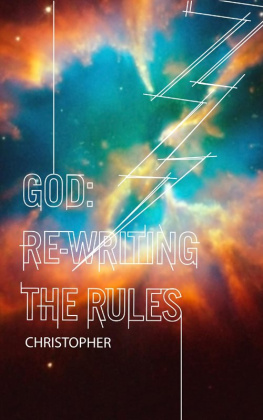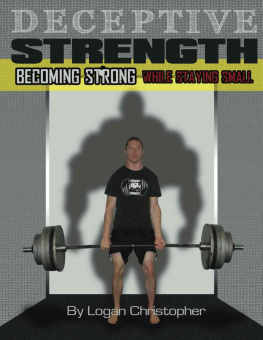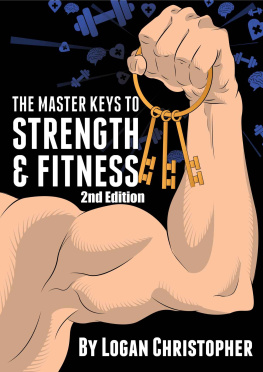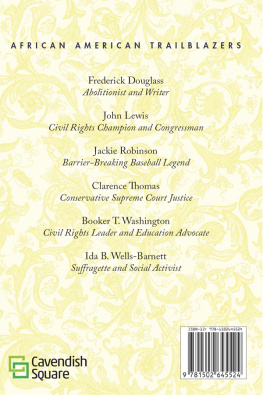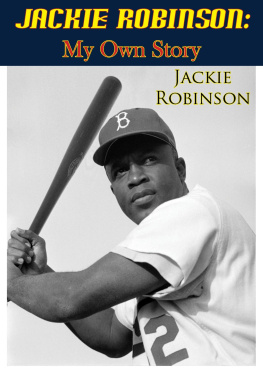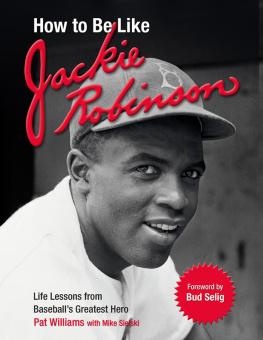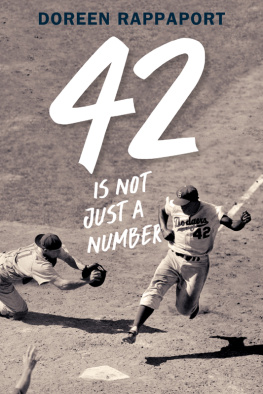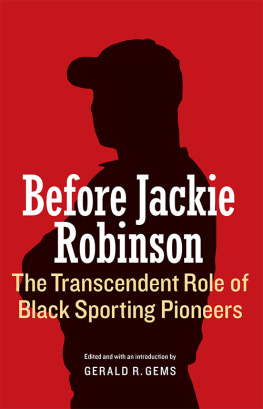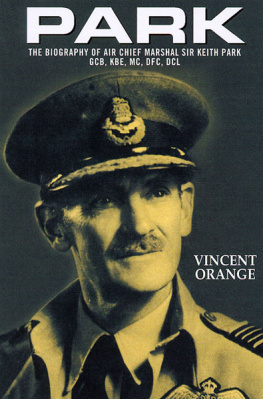Christopher - Jackie Robinson
Here you can read online Christopher - Jackie Robinson full text of the book (entire story) in english for free. Download pdf and epub, get meaning, cover and reviews about this ebook. City: New York;United States, year: 2009;2006, publisher: Little, Brown Books for Young Readers, genre: Non-fiction. Description of the work, (preface) as well as reviews are available. Best literature library LitArk.com created for fans of good reading and offers a wide selection of genres:
Romance novel
Science fiction
Adventure
Detective
Science
History
Home and family
Prose
Art
Politics
Computer
Non-fiction
Religion
Business
Children
Humor
Choose a favorite category and find really read worthwhile books. Enjoy immersion in the world of imagination, feel the emotions of the characters or learn something new for yourself, make an fascinating discovery.

- Book:Jackie Robinson
- Author:
- Publisher:Little, Brown Books for Young Readers
- Genre:
- Year:2009;2006
- City:New York;United States
- Rating:3 / 5
- Favourites:Add to favourites
- Your mark:
- 60
- 1
- 2
- 3
- 4
- 5
Jackie Robinson: summary, description and annotation
We offer to read an annotation, description, summary or preface (depends on what the author of the book "Jackie Robinson" wrote himself). If you haven't found the necessary information about the book — write in the comments, we will try to find it.
Jackie Robinson — read online for free the complete book (whole text) full work
Below is the text of the book, divided by pages. System saving the place of the last page read, allows you to conveniently read the book "Jackie Robinson" online for free, without having to search again every time where you left off. Put a bookmark, and you can go to the page where you finished reading at any time.
Font size:
Interval:
Bookmark:
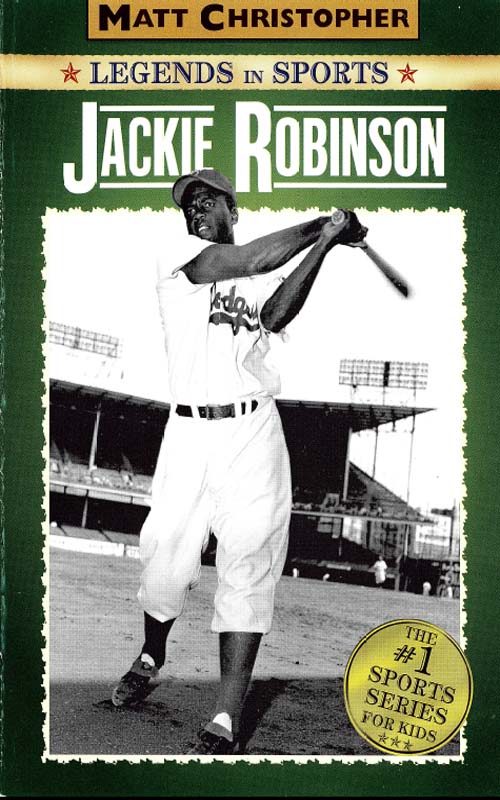
Copyright 2006 by Matt Christopher Royalties, Inc.
All rights reserved.
Little, Brown and Company
Hachette Book Group
237 Park Avenue
New York, NY 10017
Visit our website at www.HachetteBookGroup.com
www.twitter.com/littlebrown
First eBook Edition: December 2009
Matt Christopher is a registered trademark of Matt Christopher Royalties, Inc.
ISBN: 978-0-316-09497-9


Jackie Robinson changed America. Before he broke the color barrier and became the first African American to play major-league baseball in the twentieth century, American society was segregated, which means that people of different races were kept apart and rarely lived or worked together. African Americans were not permitted to use the same restaurants, hotels, schools, or even the same drinking fountains as white Americans. They were not allowed to live in certain neighborhoods or do certain jobs. Many white Americans simply didnt believe that African Americans were as smart or talented as white people were.
No African American had played major-league baseball since 1884, when Moses Fleet Walker briefly played in the American Association. Many of the men who ran professional baseball had prejudiced attitudes toward African Americans. They decided that blacks would not be allowed to play in the majors. This decision was never a written rule, for such a rule might have been challenged in a court of law. Instead, they made a secret agreement among themselves that none of them would sign an African American player.
But that didnt stop African Americans from playing the game. They organized their own teams and barnstormed around the country, playing other African American teams and semipro clubs. Later they formed their own leagues, known as the Negro Leagues. The stars of these leagues, like slugging catcher Josh Gibson and speedy Cool Papa Bell, were heroes in the African American community. When African American teams played exhibition games against major-league teams, they more than held their own. They all knew they had the ability to play in the major leagues. All they needed was an opportunity.
In 1947 a twenty-eight-year-old African American named Jackie Robinson was given that opportunity and when he took it, he made sports history.

Jack Roosevelt Robinson was born on January 31, 1919, in Cairo, Georgia. He was the fourth son and fifth child of Jerry and Mallie Robinson.
Jerry Robinson was a sharecropper. He worked on an old plantation owned by a white man named James Sasser. Although Sasser paid Robinson and other African Americans to work his fields, the money they earned wasnt enough for them to live on. Robinson and the other sharecroppers had to borrow money from Sasser to buy food and pay rent. It was difficult for them to work enough to pay back what they owed, so most were doomed to live in poverty for their entire lives.
Jerry Robinson married Mallie, the daughter of a former slave, in 1909. Soon after, they started a family. First came three sons, Edgar, Frank, and Mack, and then a daughter, Willa Mae.
Through hard work, Jerry managed to get out of debt and became a half-cropper, which meant that he was allowed to keep a small portion of his crop to feed his family and to sell at a profit. As a result, he often had some money in his pocket. At first he used the money to take care of his family. But as time went on, he started spending it on having fun in Cairo.
When Jackie was six months old, Jerry told Mallie he was going to Texas to visit his brother and find a job. He promised to send for her and the children. Instead, he went to Florida with another mans wife, never to return.
Fortunately, Mallies family came to her rescue. Her brother, Burton McGriff, worked for a doctor in California. He told Mallie that there were jobs in California for anyone willing to work hard, including African Americans. In 1920 Mallie moved her family to Los Angeles, where she got a job as a maid to a white family.
By 1923 she had saved enough money to buy a small house in Pasadena. Unfortunately, her family was not welcomed by their white neighbors. Some people spread rumors that the Robinson children were vandalizing other houses. Others circulated a petition that called for them to move. One night a wooden cross was burned on their front yard, a symbol of a hate group known as the Ku Klux Klan (KKK). The Klan considered African Americans to be subhuman and did not believe they should live or work near whites. Klan members terrorized African Americans, sometimes even killing them. By burning a cross on their lawn, the KKK hoped to scare the Robinsons out of the neighborhood.
But Mallie Robinson refused to be intimidated. Eventually, her neighbors accepted the family.
Meanwhile, at the local playground, Jackie was learning that on the playing fields, color didnt matter as much as ability. Jackie, like all the Robinson children, was a fine athlete, excelling at football, basketball, and baseball. Once the neighborhood kids realized that he was the fastest runner and best athlete at the playground, they often bribed him to play for their teams. But prejudice still existed. As soon as the game ended, many of his white teammates behaved as if they didnt even know him.
Jackie attended Grover Cleveland Elementary School. After school, he helped support the family. He sold newspapers and hot dogs and shined shoes, turning his earnings over to his mother. Only when he was done with work was he allowed to play.
When Jackie was old enough, he joined a band of boys who called themselves the Pepper Street Gang. His brother Mack was also part of the group. They challenged other Los Angeles gangs to games of football and other sports, often for small sums of money. But they also committed small crimes, like stealing golf balls from a local golf course. As a result, boys from the Pepper Street Gang were sometimes in trouble with the police.
Fortunately, sports helped keep Jackie, Mack, and the other Robinson children out of serious trouble. Edgar, the oldest, was a talented Softball player and bicyclist. Frank was a sprint champion. And in high school Mack excelled in track and field.
In fact, Mack was so talented that he had high hopes of winning a track scholarship to college. But in those days few colleges gave scholarships to African American athletes. When Mack didnt get a scholarship, Mallie, Frank, and Edgar saved money to send him to Pasadena Junior College. At PJC, he set a national junior college record in the long jump. After two years at Pasadena, he won a track scholarship to the University of Oregon.
Jackie followed Macks lead. While attending Washington Junior High, he played baseball, football, and basketball and also ran track, helping to lead each team to the league title. He even won a citywide table tennis tournament. At Muir Technical High School he continued to play sports, including baseball, which at the time was his least favorite sport.
Meanwhile, in the summer of 1936, Mack earned a spot on the United States Olympic track team. He traveled with the team to Berlin, Germany, to compete in the Games. Jesse Owens, an African American from Ohio, was the big star of that Olympics, winning four gold medals. Mack finished second to Owens in the 200-meter sprint and earned a silver medal.
Today, the winner of an Olympic medal is usually honored by his hometown. But when Mack returned to Pasadena, no one would even give him a decent job. He was finally hired as a manual laborer by the City of Pasadena. But a short time later, he and every other African American employed by the city were fired as part of the citys protest against ending segregation at a public swimming pool.
Font size:
Interval:
Bookmark:
Similar books «Jackie Robinson»
Look at similar books to Jackie Robinson. We have selected literature similar in name and meaning in the hope of providing readers with more options to find new, interesting, not yet read works.
Discussion, reviews of the book Jackie Robinson and just readers' own opinions. Leave your comments, write what you think about the work, its meaning or the main characters. Specify what exactly you liked and what you didn't like, and why you think so.

